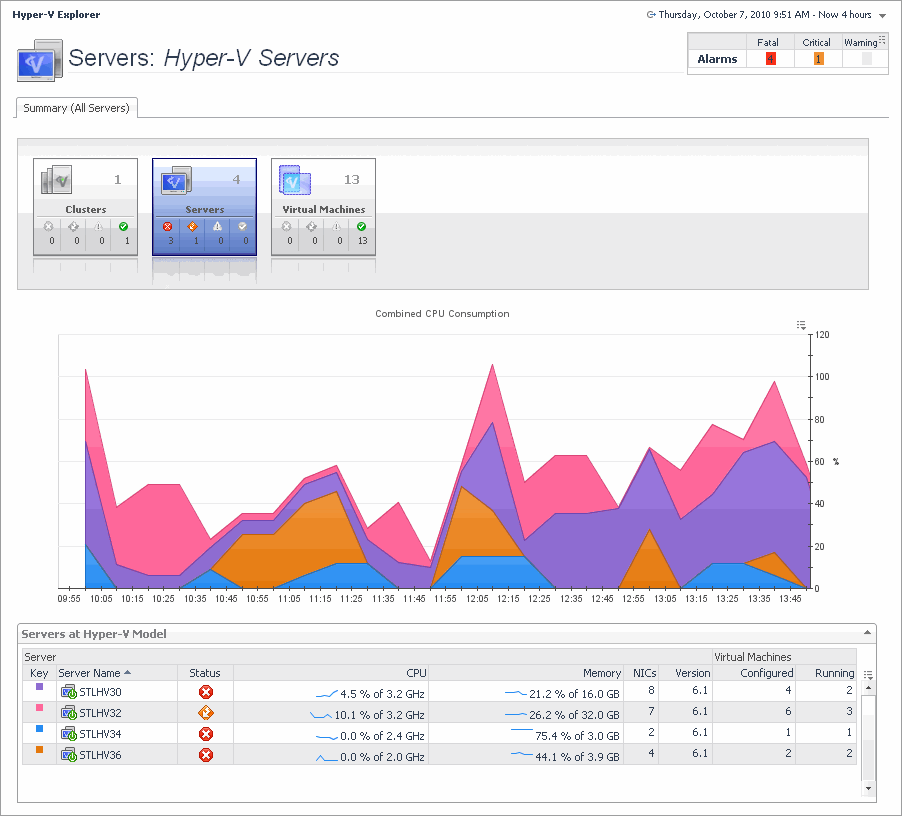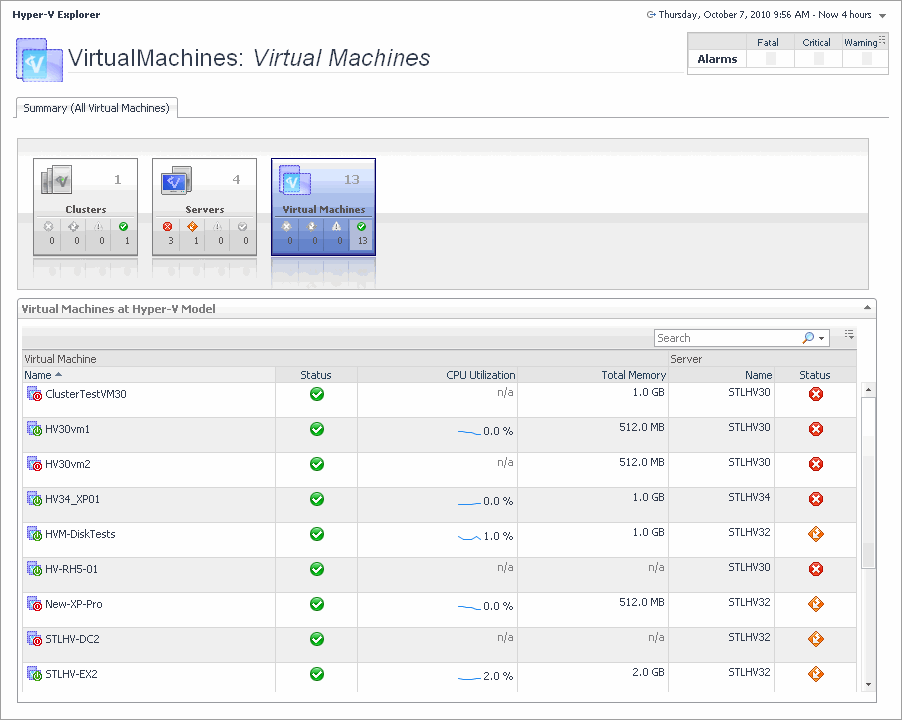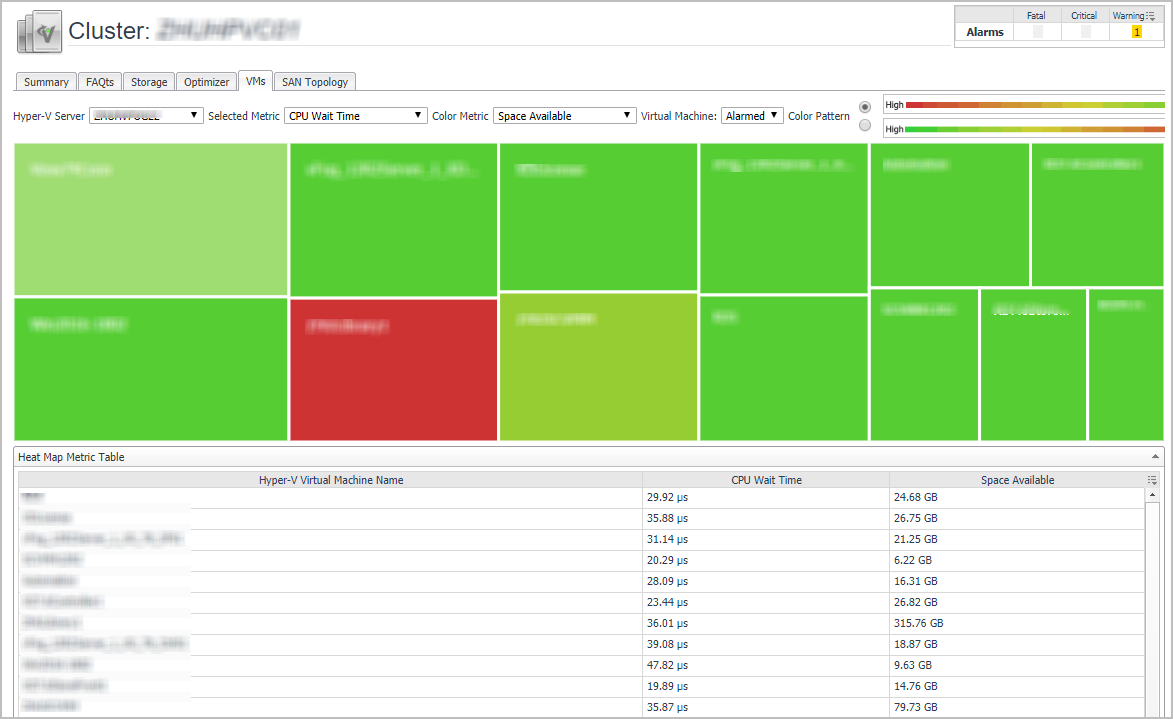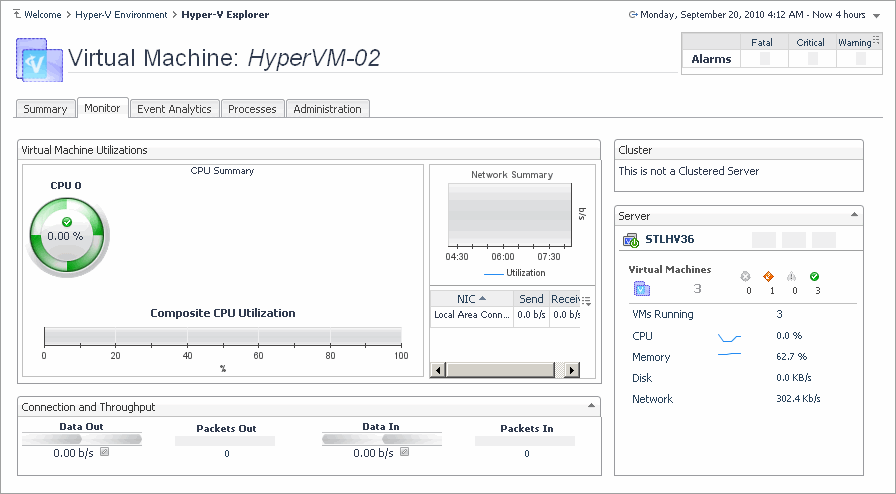Hyper-V Explorer Summary (All Servers) tab
The Hyper-V Explorer Summary (All Servers) tab shows a summary of system resources for all physical servers that currently exist in your integrated infrastructure.
This tab appears in the Hyper-V Explorer when you select the Servers node on the Hyper-V Explorer Topology tab.

|
|
This tabular view lists all servers that exist in your environment. |
|
|
|
• |
Server, CPU. The current amount of the CPU speed that is used by the server. | |
|
|
|
|
|
|
• |
Server, Memory. The current percentage of memory that is used by the server. | |
|
|
|
• |
Server, NICs. The number of network interface cards used by the server. | |
|
|
|
|
|
|
• |
Server, Status. The server status, associated with any alarms raised against it. If no alarms are fired, the status appears as Normal. Otherwise, the status is set to the highest alarm severity (Warning, Critical, or Fatal). | |
|
|
|
• |
Server, Version. The version number of the Windows OS running on the server. | |
|
|
|
|
|
|
|
|
Drill down on any server entry. The Hyper-V Environment dashboard appears, showing the server details on the Hyper-V Explorer Summary tab. |
|
|
The Hyper-V Explorer’s Virtual Environment view displays a high-level overview of your virtual environment. The view has a tile for each type of object in your virtual infrastructure: Clusters, Servers, and Virtual Machines. Each tile shows how many of the corresponding object instances there are in your virtual infrastructure, as well as the count of objects of that type in each of the alarm states (Normal, Warning, Critical, Fatal). |
|
|
|
• |
Alarm counts. The total counts of alarms associated with the clusters, servers, or virtual machines, broken down by alarm types (Normal, Warning, Critical, Fatal). | |
|
|
|
• |
Cluster count. The number of physical servers in your virtual environment. | |
|
|
|
• |
Server count. The number of physical servers in your virtual environment. | |
|
|
|
|
|
Drill down on: |
|
|
|
• |
Clusters. Displays the Clusters dwell, showing the names and states of all clusters in your environment. |
|
|
|
|
• |
Servers. Displays the Servers dwell, showing the name and state of all servers in your environment. |
|
|
|
|
• |
Virtual Machines. Displays the Virtual Machines dwell, showing the names and states of all virtual machines in your environment. |
|
Hyper-V Explorer Summary (All Virtual Machines) tab
The Hyper-V Explorer Summary (All Virtual Machines) tab shows a summary of system resources for all virtual machines that currently exist in your integrated infrastructure.
This tab appears in the Hyper-V Explorer when you select the Virtual Machines node on the Hyper-V Explorer Topology tab.

This tab is made up of the following embedded views:
|
|
The Hyper-V Explorer’s Virtual Environment view displays a high-level overview of your virtual environment. The view has a tile for each type of object in your virtual infrastructure: Clusters, Servers, and Virtual Machines. Each tile shows how many of the corresponding object instances there are in your virtual infrastructure, as well as the count of objects of that type in each of the alarm states (Normal, Warning, Critical, Fatal). |
|
|
|
• |
Alarm counts. The total counts of alarms associated with the clusters, servers, or virtual machines, broken down by alarm types (Normal, Warning, Critical, Fatal). | |
|
|
|
• |
Cluster count. The number of physical servers in your virtual environment. | |
|
|
|
• |
Server count. The number of physical servers in your virtual environment. | |
|
|
|
|
|
Drill down on: |
|
|
|
• |
Clusters. Displays the Clusters dwell, showing the name and state of all clusters in your environment. |
|
|
|
|
• |
Servers. Displays the Servers dwell, showing the name and state of all servers in your environment. |
|
|
|
|
• |
Virtual Machines. Displays the Virtual Machines dwell, showing the names and states of all virtual machines in your environment. |
|
|
|
This tabular view lists all virtual machines that exist in your environment. |
|
|
|
• |
Server, Name. The name of the server on which the virtual machine is running. | |
|
|
|
• |
Server, Status. The status of the server on which the virtual machine is running, associated with any alarms raised against it. If no alarms are fired, the status appears as Normal. Otherwise, the status is set to the highest alarm severity (Warning, Critical, or Fatal). | |
|
|
|
|
|
|
|
|
|
• |
Virtual Machine, Status. The virtual machine status, associated with any alarms raised against it. If no alarms are fired, the status appears as Normal. Otherwise, the status is set to the highest alarm severity (Warning, Critical, or Fatal). | |
|
|
|
|
|
Drill down on any virtual machine entry. The Hyper-V Environment dashboard appears, showing the server details on the Hyper-V Explorer Summary tab. |
Hyper-V Explorer VMs
The Hyper-V Explorer VMs tab appears when you are exploring individual clusters. The VMs tab is consisted by a Heat Map Chart: and a Metric Table:.

Hyper-V Explorer Monitor
The Hyper-V Explorer Monitor tab appears when you are exploring individual servers and virtual machines. It provides more details about the component’s resource usage, such as the utilization of each individual CPU, server, and cluster performance, and the data throughput rate.
